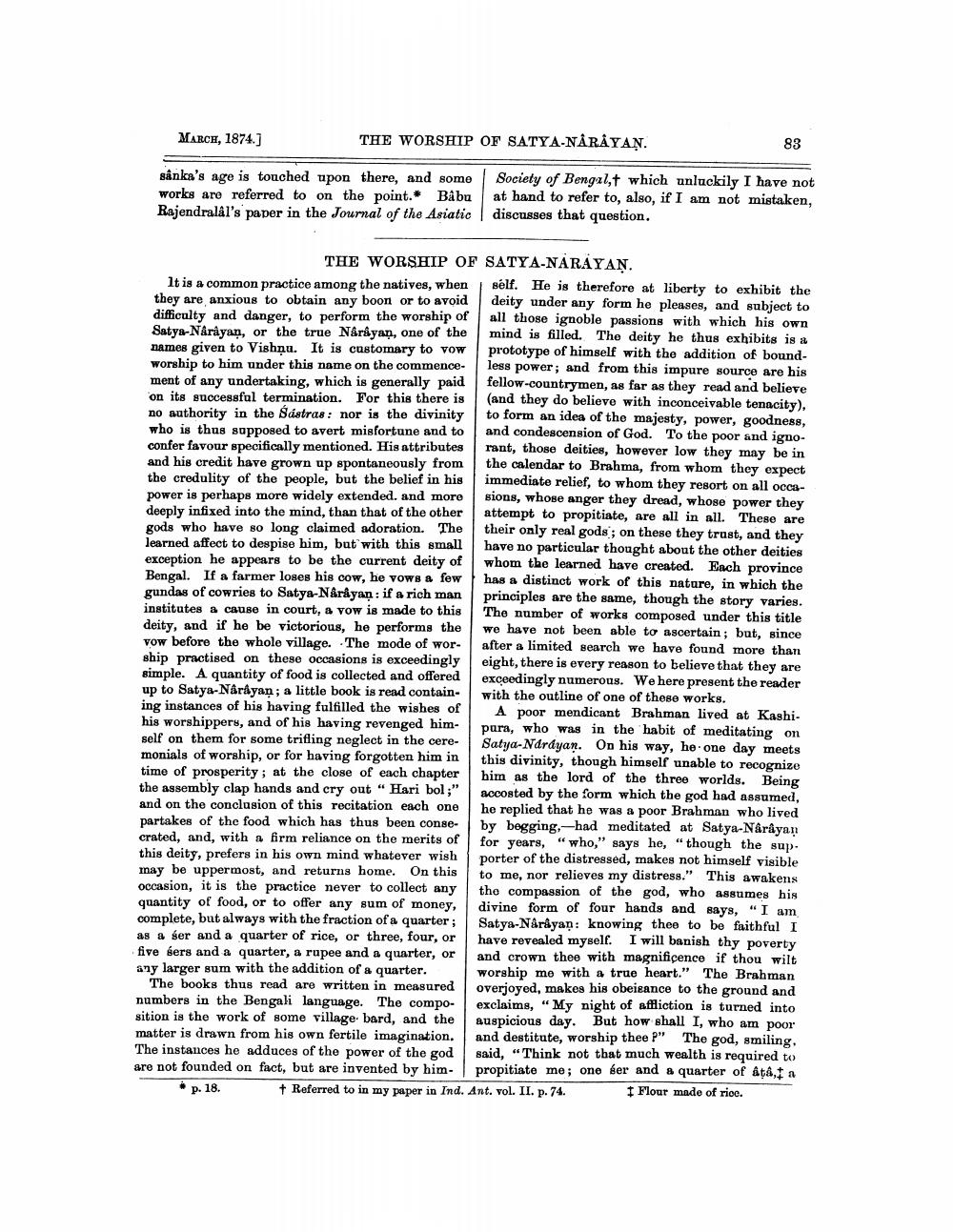________________
MARCH, 1874.]
THE WORSHIP OF SATYA-NÅRÅYAN.
83
sanka's age is touched upon there, and some works are referred to on the point. Babu Rajendralal's paper in the Journal of the Asiatic
Society of Bengal,t which unluckily I have not at hand to refer to, also, if I am not mistaken, discusses that question.
THE WORSHIP OF SATYA-NARAYAN. It is a common practice among the natives, when self. He is therefore at liberty to exhibit the they are anxious to obtain any boon or to avoid deity under any form he pleases, and subject to difficulty and danger, to perform the worship of all those ignoble passions with which his own Satya Narayan, or the true Narayan, one of the mind is filled. The deity he thus exhibits is a names given to Vishnu. It is customary to vow prototype of himself with the addition of boundworship to him under this name on the commence- less power; and from this impure source are his ment of any undertaking, which is generally paid fellow-countrymen, as far as they read and believe on its successful termination. For this there is (and they do believe with inconceivable tenacity), no authority in the Sástras: nor is the divinity to form an idea of the majesty, power, goodness, who is thus supposed to avert misfortune and to and condescension of God. To the poor and ignoconfer favour specifically mentioned. His attributes rant, those deities, however low they may be in and his credit have grown up spontaneously from the calendar to Brahma, from whom they expect the credulity of the people, but the belief in his immediate relief, to whom they resort on all nees power is perhaps more widely extended, and more sions, whose anger they dread, whose power they deeply infixed into the mind, than that of the other attempt to propitiate, are all in all. These are gods who have so long claimed adoration. The their only real gods; on these they trust, and they learned affect to despise him, but with this small have no particular thought about the other deities exception he appears to be the current deity of whom the learned have created. Each province Bengal. If a farmer loses his cow, he vows a few has a distinct work of this nature, in which the gundas of cowries to Satya Narayan: if a rich man principles are the same, though the story varies. institutes a cause in court, a vow is made to this The number of works composed under this title deity, and if he be victorious, he performs the we have not been able to ascertain; but, since vow before the whole village. The mode of wor- after a limited search we have found more than ship practised on these occasions is exceedingly eight, there is every reason to believe that they are simple. A quantity of food is collected and offered exceedingly numerous. We here present the reader up to Satya Narayan; a little book is read contain- with the outline of one of these works. ing instances of his having fulfilled the wishes of A poor mendicant Brahman lived at Kashihis worshippers, and of his having revenged him- para, who was in the habit of meditating on self on them for some trifling neglect in the cere- Satya-Ndrdyan. On his way, he one day meets monials of worship, or for having forgotten him in this divinity, though himself unable to recognize time of prosperity; at the close of each chapter him as the lord of the three worlds. Being the assembly clap hands and cry out "Hari bol;" accosted by the form which the god had assumed, and on the conclusion of this recitation each one he replied that he was a poor Brahman who lived partakes of the food which has thus been conse- by bogging-had meditated at Satya-Narayan crated, and, with a firm reliance on the merits of for years, “who," says he," though the supthis deity, prefers in his own mind whatever wish porter of the distressed, makes not himself visible may be uppermost, and returns home. On this to me, nor relieves my distress." This awakens occasion, it is the practice never to collect any the compassion of the god, who assumes his quantity of food, or to offer any sum of money, divine form of four hands and says, "I am complete, but always with the fraction of a quarter ; Satya-Narayan: knowing thee to be faithful I as a ser and a quarter of rice, or three, four, or have revealed myself. I will banish thy poverty five sers and a quarter, a rupee and a quarter, or and crown thee with magnificence if thou wilt any larger sum with the addition of a quarter. worship me with a true heart." The Brahman
The books thus read are written in measured overjoyed, makes his obeisance to the ground and numbers in the Bengali language. The compo- exclaims, "My night of affliction is turned into sition is the work of some village bard, and the auspicious day. But how shall I, who am poor matter is drawn from his own fertile imagination. and destitute, worship thee P" The god, smiling, The instances he adduces of the power of the godsaid, "Think not that much wealth is required to are not founded on fact, but are invented by him- propitiate me; one ber and a quarter of atta p. 18. + Referred to in my paper in Ind. Ant. vol. II. p. 74.
Flour made of rice.




